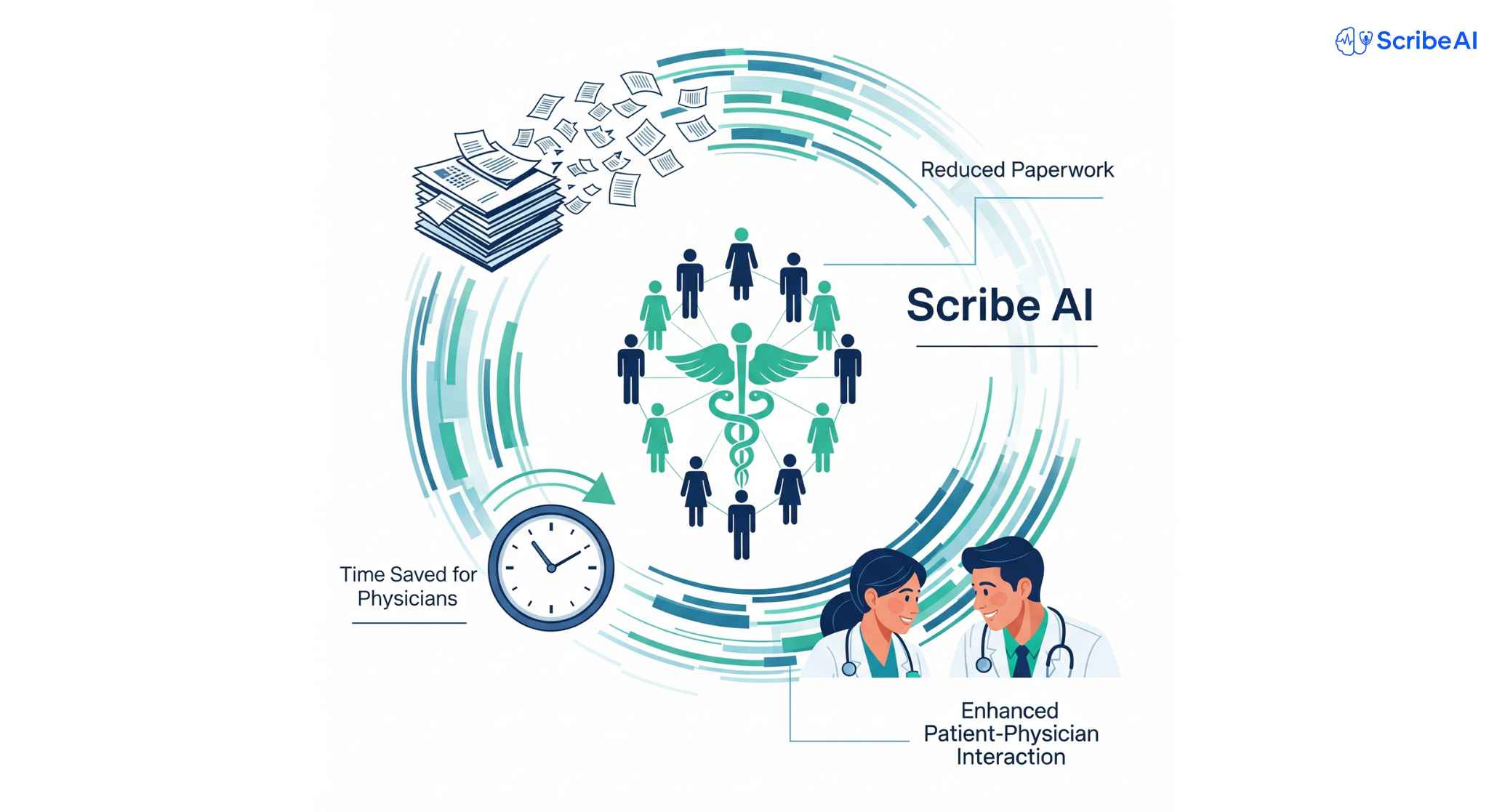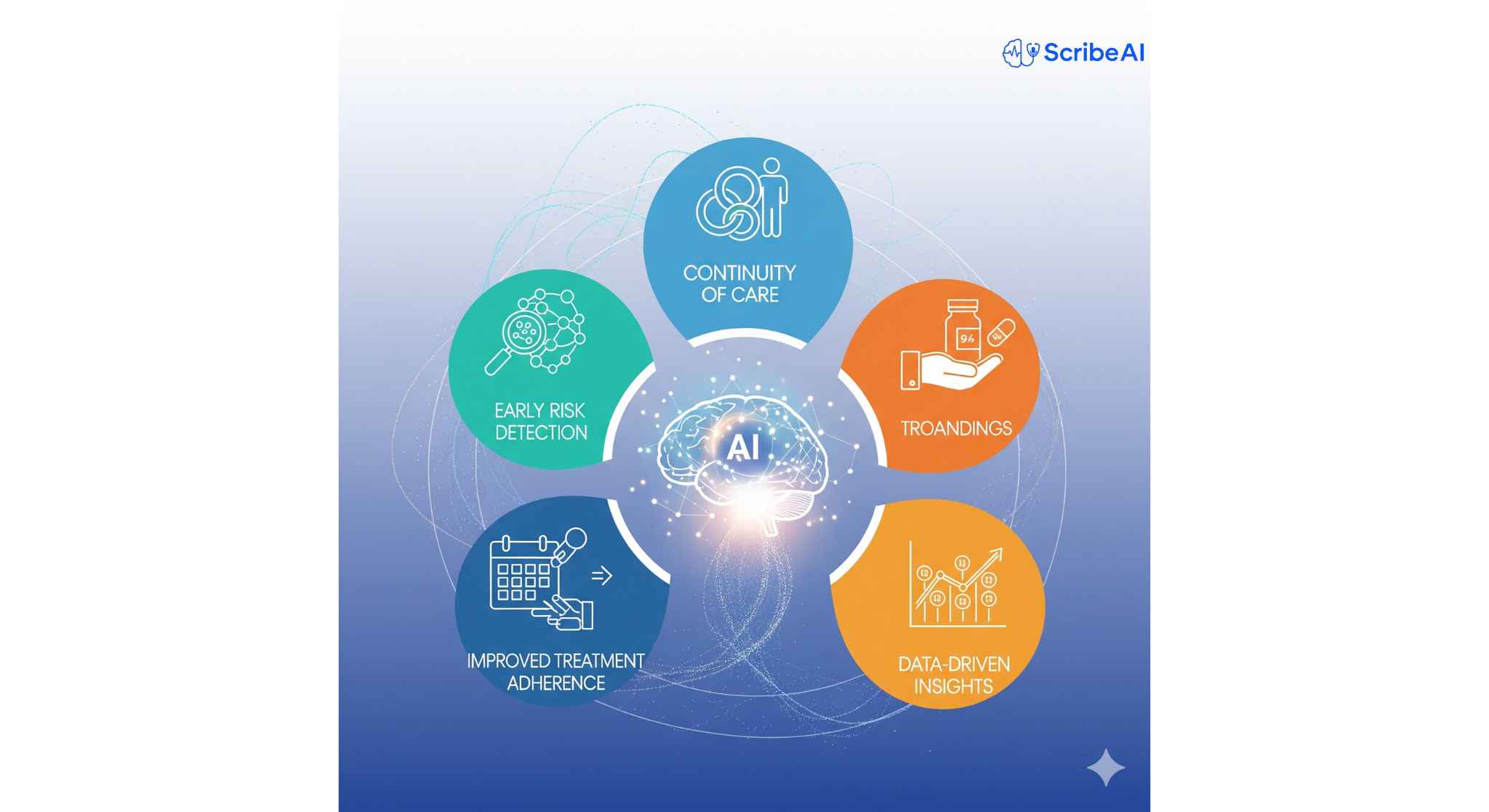The Documentation Dilemma in U.S. Clinics
Numerous doctors are familiar with the overwhelming charting demands that healthcare professionals face. Studies have shown that doctors spend 1-2 hours writing notes for every hour they are seeing patients. This results in:
- Long hours work days with extra hours charting.
- Increased chance for errors in clinical notes as a result of fatigue.
- Less time to spend on developing relationships with patients.
- Provider Fatigue and Burnout Getting Worse.
While there is a demand for data to be streamlined, traditional EHR systems tend to add administrative burden. The number of clicks, coding requirements, and compliance requirements have turned documentation into one of the most dreaded tasks in clinical practice.
This is where Scribe AI Health steps in to offer a mighty alternative: intelligent, AI-powered documentation assistance that doesn't just transcribe words but comprehends the context of the medical conversation.
What is Scribe AI Health?
Scribe AI Health is an advanced medical scribe platform that uses natural language processing (NLP), machine learning, and healthcare-specific algorithms to create accurate, compliant, and context-aware medical records.
Rather than taking notes by hand, clinicians can engage with patients naturally -- speaking freely while the AI listens, understands and creates structured documentation.
Key features include:
- Automatic generation of clinical documentation in real time.
- Seamless Integration with EHR Systems: Integration with EHR systems to ensure smooth workflows.
- Tailoring for specialties (cardiology, pediatrics, orthopedics, etc.).
- HIPAA-compliant security to safeguard patient sensitive information.
Unlike traditional transcription, Scribe AI doesn't just record--it contextualizes. For instance, if a doctor responds with, "Patient presents with chest pain, history of hypertension, prescribed lisinopril" - the system will automatically code the encounter and generate all the members of the healthcare record.
Stocks in Conformity with Paper Reduction Act
The U.S. Paper Reduction Act was meant to reduce unnecessary paperwork throughout federal agencies, and the spirit of the act carries over into healthcare. Although EHR systems were supposed to help solve documentation issues, many clinicians were left with an increased workload.
Scribe AI Health meets the promise of the Paper Reduction Act by:
- Limiting manual charting, and paperwork.
- Reducing the duplication of data input between systems.
- Reducing hours of documentation time to minutes.
- "Providing physicians with more time to interact with patients instead of with screens."
In tandem with federal priorities, Scribe AI Health is not merely a technological marvel but also a compliance-centric solution aiding U.S. clinics in complying with documentation efficiency mandates.

How Scribe AI Health Can Enhance Patient Care
Documentation is not only about compliance--it directly affects the quality of care. Incorrect or incomplete notes can result in medical errors, missed diagnoses, or delayed treatments.
With Scribe AI, clinicians have:
- More Accurate Notes - AI helps in ensuring structured and complete clinical notes, eliminating ambiguity.
- Faster Access to Information - Healthcare documentation is organized and will allow faster decision-making.
- Reduced Burnout - By alleviating administrative burden, clinicians are more present, attentive and empathetic.
- Improved Patient Interaction - With decreased screen time, providers have more time for valuable patient engagement.
In the end, that benefits the healthcare patient experience and improves the trust that exists between clinicians and their patients.
The Patient Perspective - The Importance of Documentation
From a patient's perspective, documentation can be perceived as "background work," but it is a huge part of their journey:
- Patients can feel like they're not being heard when a doctor rushes to type notes on a chart during a visit.
- A delay in charting can have an impact on treatment planning and follow-up.
- Clinician's notes can be wrong, leading to incorrect medications or incomplete histories.
By leveraging the capabilities of Scribe AI Health, clinics demonstrate their commitment to efficiency and quality to patients. The result is better charting, but also a more human-centered healthcare patient experience. Patients say they are more satisfied when providers are able to focus their attention on conversations instead of keyboards.
AI and Patient Outcomes
The end result for any healthcare innovation should be better patient outcomes. Documentation may not be as obvious as diagnostics or treatment, but it has a direct effect on results.
How Scribe AI can help drive results:
- Early opportunity to detect risks - Proper documentation means that red flags are seen earlier.
- Continuity of care - Detailed notes ensure easier transitions between providers.
- Improved adherence - Patients are more likely to comply with treatment if physicians take the time to explain, rather than type.
- Data-driven insights - Structured records enable more effective analysis and population health management.

By eliminating gaps and ensuring high-quality documentation, Scribe AI Health contributes to the long-term vision of a healthcare system built on safety, trust, and better patient outcomes.
Compliance and Trust
Medical data is the most important area when it comes to trust. Patients must have the right to know that their sensitive data is secure, and clinics have to comply with HIPAA and regulatory frameworks.
Scribe AI Health builds trust by:
- HIPAA compliance in all data processing.
- End-to-end Encryption for clinical records.
- Audit-ready logs to provide accountability.
- Bias-mitigating algorithms to provide accurate healthcare documentation across patient populations.
This dedication to compliance and security ensures that clinics can embrace AI with confidence, knowing the safety and integrity of the services are of paramount importance.
Case Study - A U.S. Clinic Transformation
Let's consider the case of a mid-sized family practice in Texas that rolled out Scribe AI Health in 2024. Prior to adoption:
- Physicians spent an average of five hours, or 2.5 hours after hours, charting each day.
- Patient wait times were increased as a result of documentation delays.
- Clinician satisfaction was reduced to 55%.
After 6 months with Scribe AI:
- Charting time reduced by 70%.
- Patient satisfaction scores increased by 22 percent.
- Clinician burnout was significantly reduced, and satisfaction went up to 85%. Error rates of documentation were reduced by almost 40%.
This case study shows how Scribe AI Health produces measurable results not just in documentation but in healthcare patient experience and positive patient outcomes as well.
ScribeAI is an innovative AI medical scribe application that aims to make the clinician documentation process an efficient, flowing experience.It also can save clinicians time by properly transcribing and organizing medical dialogue into care-ready SOAP notes (and complementary ICD-10, ICD-11, and RxCui codes), thereby giving them time to engage with patients rather than to write out paperwork.ScribeAI can provide the best accuracy (up to 98.9 %) and reliability with an 70+ languages support, over 30 specialties, and real-time EHR/EMR integration.With the support of hundreds of doctors, enterprise-level security and 24/7 support, it is not a tool--it is your unseen partner in bringing efficient, effective, and caring care.
Your time is valuable - and your skills need to be used with patients, not documentation. Get ScribeAI off your hands. Request a Live Demo to see with your own eyes how our AI scribe helps to transform the consultation workflows.
Try It for Free and watch how fast ScribeAI can adjust to your practice--down to saving more than 2 hours of documentation time a day. Get Your ROI and learn how ScribeAI can not only eliminate burnout but also enhance provider throughput by up to 20 Percent -with huge returns. Stop by the ScribeAI site or contact them directly by email or phone to get started.Your future of short, high quality clinical notes is only a click away.
Frequently Asked Questions :
Q1. What is ScribeAI ?
ScribeAI records and transcribes conversations between clinicians and patients in real-time and then uses AI to find and organize essential medical information into SOAP-formatted notes.The notes can be reviewed and approved by the clinicians and are accurate and compliant.
Q2. To what extent is the transcription accurate?
ScribeAI provides 98.9 percent accuracy and generates structured clinical notes containing ICD-10, ICD-11, and RxCui codes with high accuracy.
Q3. What medical specialties and languages is ScribeAI able to support?
The platform serves over 30 different medical specialties and is capable of processing over 70 languages- guaranteeing correct and clinical-grade translation in a wide range of contexts.
Q4. Is ScribeAI connected to Electronic Health Records (EHRs)?
Yes, ScribeAI is operating on an EHR and EMR drag and drop platform that provides a unified workflow and a write-back documentation solution.
Q5. What are the billing and clinical decision-making features?
In addition to transcription services ScribeAI has ICD and CPT code recommendations, diagnostic advice, customizable templates (such as after-visit summaries and dot phrases), optimizing the quality of documentation and billing.